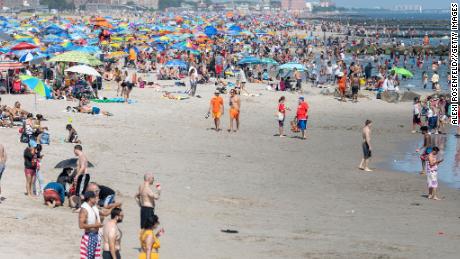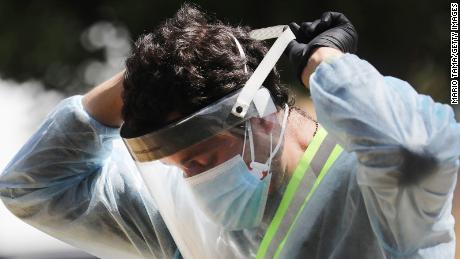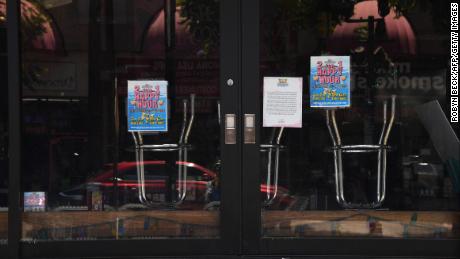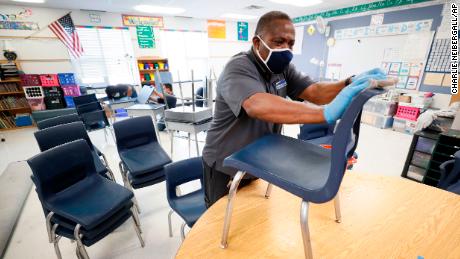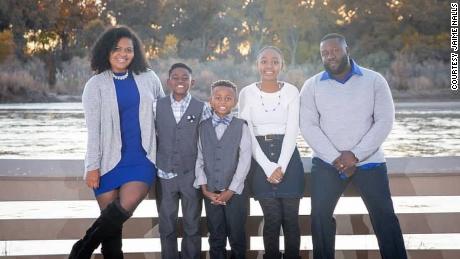To prevent the outbreak from spinning out of control, US residents must focus on controlling crowds, wearing masks and doing a better job at physical distancing, Dr. Anthony Fauci told the Wall Street Journal in a podcast Wednesday.
Climbing cases, sparked in part by loosened restrictions, have motivated many states to pause or roll back plans to reopen economies after widespread shutdowns in the spring.
“We’ve got to just tighten things up, close the bars, indoor restaurants … or make it so there’s very good seating, make sure people wear masks, make sure they don’t congregate in crowds, make sure they keep the distance,” Fauci urged.
“If you do those simple public health measures, guarantee you’re going to see that curve come down. It’s happened, time and again in virtually every country that’s done that.”
Where states stand
Many states are feeling the effects of the coronavirus surge.
With 98 coronavirus-related deaths in one day, Texas set its record for highest single-day fatality increases Wednesday. The state also reported its second highest number of daily new cases at 9,979.
Louisiana made great strides in managing the virus in June, but the past three weeks has undone all of that with high levels of community spread, a death toll at 3,231 and increased hospitalization, Gov. Jon Bel Edwards said Wednesday.
With hospitalizations rising and the virus spreading, New Orleans Mayor LaToya Cantrell announced Wednesday that bars and restaurants will be limited to 25 patrons inside with bar seating prohibited and masks required.
Philadelphia is combating the virus by recommending that people avoid traveling to or from states with “high-incidences” of coronavirus and self-quarantine for 14 days if they do.
California cases are rising after early success
California, one of the first states to implement restrictions to stem the spread of the virus and among the slowest to lift them, is now wrestling with a worsening situation.
In Los Angeles, coronavirus infection rates are on the rise, and hospitalization rates have climbed to levels not seen since April, Health Director Barbara Ferrer announced in a news conference Wednesday.
The city is currently at a high level of risk and could get worse in the next week or two, said Mayor Eric Garcetti. If it does reach the next threat level, Los Angeles would likely return to a safer at home order, he said.
The cases are particularly growing among people between 18 and 40-years-old, Garcetti said. That age range made up 30% of the cases a few weeks ago, then 40% last week and is now at more than 50%, he said.
In Southern California, the intensive care unit at a Ventura County hospital reached its full capacity after receiving an influx of coronavirus patients, Dr. John Fankhauser, CEO at Ventura County Medical Center, said Wednesday, adding that the ICU at the facility is now full.
Back to school still in question
As cases and hospitalizations rise, an answer to the question of whether children will return to school in the fall becomes less clear.
threatened to cut federal funding of schools that don’t reopen.
The White House has also claimed the CDC’s guidelines for reopening schools is too strict. But public health expert Dr. Ashish Jha told Pamela Brown Wednesday on “The Lead” that the guidelines are the minimum of what should be required.
“I think they should go further. Look, you can open up schools anywhere you want,” Jha, the faculty director of the Harvard Global Health Institute, said.
There is still mystery surrounding how the virus affects children. At first experts thought children were not contracting the virus as frequently and were not impacted as severely.
But a study published in an American Academy of Pediatrics journal found that children did not show the same symptoms of coronavirus as adults and that coronavirus targeted tests miss cases in children.
Guidelines from the US Centers for Disease Control and Prevention recommend only testing patients with fever, cough and shortness of breath, who traveled to high-risk countries and who came into close contact with someone with a confirmed case.
But the children who tested positive in the study were admitted to the hospital with seemingly unrelated symptoms, including bacterial infections, appendicitis and inflamed muscles. The researchers say it is unclear how large a role coronavirus played in their illness.
CNN’s Jenn Selva, Pierre Meilhan, Kay Jones, Raja Razek, Sarah Moon, Lauren Mascarenhas and Shelby Lin Erdman contributed to this report.

